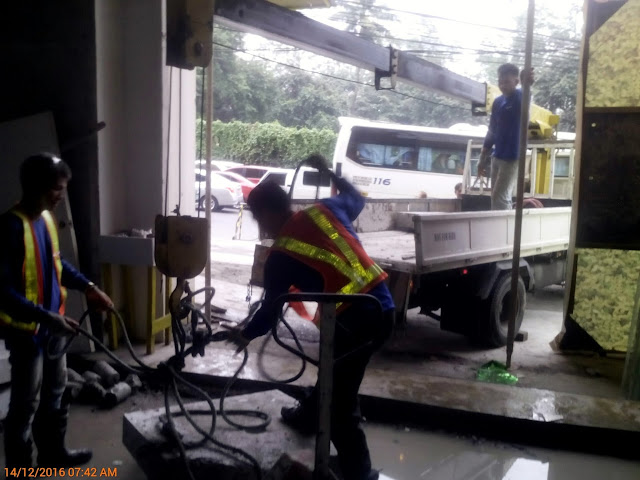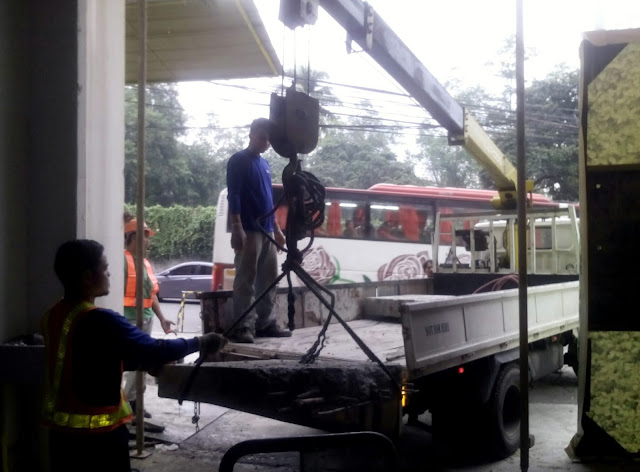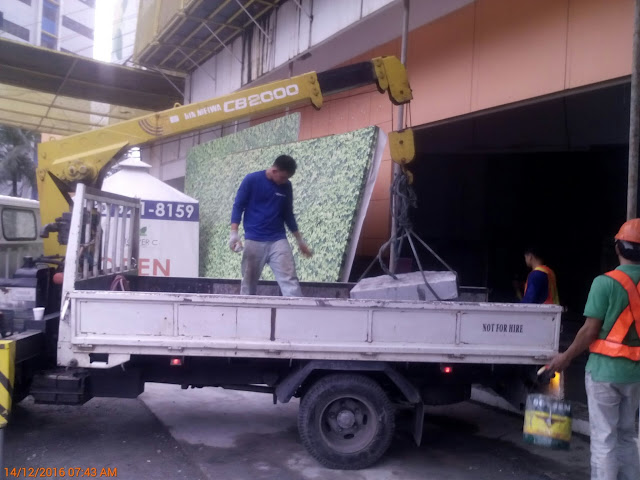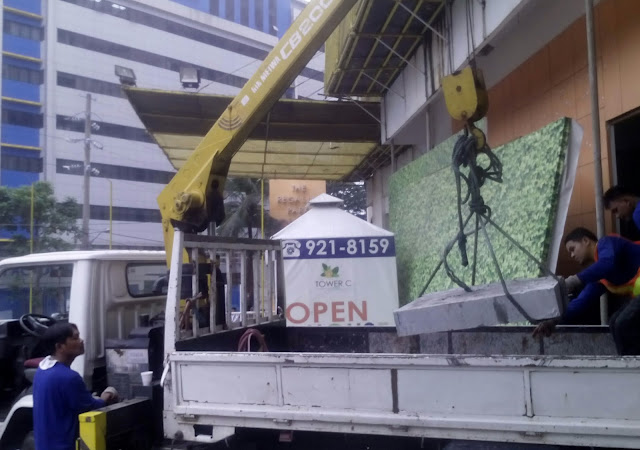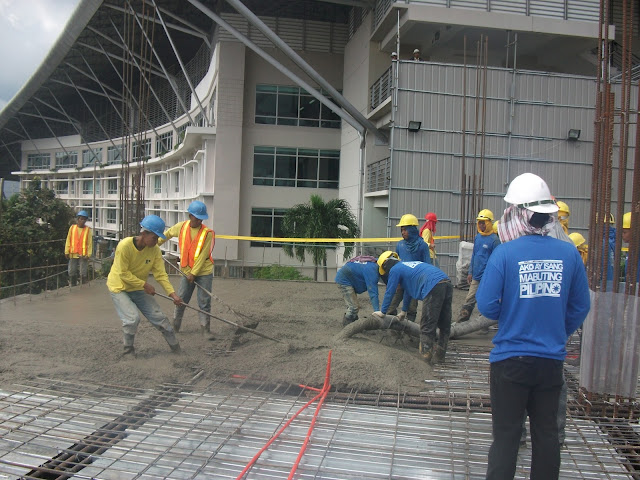January 8, 2018
MABUHAY!
This is a photo and video journal of my attendance to this training at Philconstruct 2018. As an advocate of continuous professional education in the construction industry, I personally find this training an eye opener on the magnitude of what else we can contribute to enhance the quality of CONCRETE.
Showing posts with label concrete. Show all posts
Showing posts with label concrete. Show all posts
Tuesday, May 8, 2018
CONCRETE CONSTRUCTION PRODUCTIVITY BOOTCAMP 2018
Friday, May 4, 2018
VISIT TO PHILCONSTRUCT 2018
January 8, 2018
This is a photo and video journal of my attendance to Philconstruct 2018 at SMX Convention center Pasay City, Metro Manila
Friday, March 3, 2017
INNOVATION: DUSTLESS ELECTRIC RANDOM ORBITAL SANDER
June 23, 2016
MABUHAY!
Have you been doing rub concrete in your construction project using traditional grinders? Most likely, it looks like this.
Dirty.
Full of dust.
Hazardous to health.
DEMO OF MIRKA ELECTRIC ORBITAL SANDER ON CONCRETE SURFACE
CLICK the LINK to READ the related article: Concrete Construction Productivity Bootcamp 2018
This innovative tool is effective in sanding the concrete surface already applied with a skim coat, removing small concrete laitances or smooth finishing of joint putty on drywall partition and ceiling. With the sanding tool attached to a vacuum, the dust is already controlled thereby making your work very clean and hazard-free to your health.
For the tool specification and variety of sanding tools and accessories, you can visit their website by clicking this link MIRKA ABRASIVES
We should never stop innovating, inventing, discovering, educating and making things if not better, the best.
CLICK the LINK to READ the related article: Quality Issue: Paint Peel-Off
MABUHAY!
Have you been doing rub concrete in your construction project using traditional grinders? Most likely, it looks like this.
Dirty.
Full of dust.
Hazardous to health.
When I attended World Building Expo (WORLDBEX) at World Trade Center Manila on March 2016, I visited the booth of Globe International Distributor Center Inc, (GIDCI) distributor of MIRKA dustless sanding machine from Finland. They agreed to conduct a product demonstration in one of our project.
CLICK the LINK to READ the related article: Enhancing Construction Education by Attending Philconstruct 2016
Sanding on Reinforced concrete column
Sanding on Reinforced concrete wall
Sanding on beam and slab soffit
CLICK the LINK to READ the related article: Concrete Construction Productivity Bootcamp 2018
This innovative tool is effective in sanding the concrete surface already applied with a skim coat, removing small concrete laitances or smooth finishing of joint putty on drywall partition and ceiling. With the sanding tool attached to a vacuum, the dust is already controlled thereby making your work very clean and hazard-free to your health.
For the tool specification and variety of sanding tools and accessories, you can visit their website by clicking this link MIRKA ABRASIVES
We should never stop innovating, inventing, discovering, educating and making things if not better, the best.
CLICK the LINK to READ the related article: Quality Issue: Paint Peel-Off
Friday, February 3, 2017
Tuesday, January 31, 2017
QUALITY ISSUE: CONCRETE HAIRLINE CRACKS
January 31, 2017
MABUHAY!
HAIRLINE CRACKS ON CONCRETE SLAB
MABUHAY!
Another quality issue that requires a careful study on what rectification method to apply is the concrete hairline cracks. This is the most common punch list for rectification during the handover phase of a building construction. Concrete has relatively high compressive strength, but is significantly lower in tensile strength, and as such is usually reinforced with materials that are strong in tension (often steel). The elasticity of concrete is relatively constant at low stress levels but starts decreasing at higher stress levels as matrix cracking develops. Concrete has a very low coefficient of thermal expansion, and as it matures concrete shrinks. Due to shrinkage and tension, all concrete structures will crack to some extent. Concrete hairline cracks manifest in many ways:
HAIRLINE CRACKS ON CONCRETE SLAB
Tuesday, December 13, 2016
CONTROLLED DEMOLITION : A SYSTEMATIC WAY OF KNOCKING DOWN CONCRETE
December 9, 2016
MABUHAY!
Tired of using the usual sledgehammer, jackhammer or even explosives in your concrete demolition works?
Since sledgehammer requires a large amount of manual human strength, Jackhammers sounds like World War 2 machine guns and the use of explosive is strictly regulated in the Philippines, we now use concrete cutters, coring drill and other tools and equipment for a demolition technique called controlled demolition. Whenever there is a revision in construction plan and a need to free up some space that is already concreted, this technique is used.
Advantages of controlled demolition:
1. To make the demolition safe.
2. To make the debris manageable for hauling.
3. To lessen the excessive use of Jackhammers
PROJECT DESCRIPTION
To demolish a 120mm thick concrete slab to free up some space for a high ceiling.
METHODOLOGY
1. Determine the size of the square cut. The weight of the concrete has a significant impact on the size of the cut. The normal weight of 1 cubic meter of concrete is 2,400 kgs. So for 1 meter by meter square cut with the thickness of 120 mm weighs around 288 kgs.
2. Determine also the direction where you will pull out the concrete slab already cut. Make a hallow preliminary thin cut with a concrete cutting machine to mark permanently the square.
3. Set up the coring machine. For this particular project, the diameter of the coring bit is 100mm diameter.
CLICK the LINK to READ the related article: Quality Issue: Concrete Hairline Cracks
5. Cut the 3 sides of the square deep enough that the blade of the cutter must penetrate through the slab.
6. Position the scaffolding on top of the concrete for the pull-out. Place a steel beam at the top center to anchor the chain block.
7. Place the end of the lifting chain on the bored hole. Provide pipe or reinforcing bar stopper at the end of the chain.
8. When the slab is already secure by the chained block, cut the end of the square.
CLICK the LINK to READ the related article: Innovation: Skim Coat and Concrete Mortar Binder for Concrete Surface Correction
9. Start pulling up the sliced concrete slab by the chained block until it snaps out of its place. Put two round steel pipe at the back of the slab to serve as rollers.
10. Once the slab was placed on the top of the steel pipe, roll them out to the nearest stock area using a 20mm reinforcing bar.
11. Stockpile the slabs for hauling. The vehicle to be used for hauling must be a boom truck.
CLICK the LINK to READ the related article: Heavy Equipment in Construction - Making our Work Accurately Fast
Now you have an idea of an alternative method of demolishing concrete other than the usual use of sledgehammer or jackhammer. On top of these procedures, secure your work place properly to prevent unnecessary accidents. Make SAFETY a way of life!
CLICK the LINK to READ the related article: Concrete Construction Productivity Bootcamp 2018
MABUHAY!
Tired of using the usual sledgehammer, jackhammer or even explosives in your concrete demolition works?
Since sledgehammer requires a large amount of manual human strength, Jackhammers sounds like World War 2 machine guns and the use of explosive is strictly regulated in the Philippines, we now use concrete cutters, coring drill and other tools and equipment for a demolition technique called controlled demolition. Whenever there is a revision in construction plan and a need to free up some space that is already concreted, this technique is used.
Advantages of controlled demolition:
1. To make the demolition safe.
2. To make the debris manageable for hauling.
3. To lessen the excessive use of Jackhammers
PROJECT DESCRIPTION
To demolish a 120mm thick concrete slab to free up some space for a high ceiling.
METHODOLOGY
1. Determine the size of the square cut. The weight of the concrete has a significant impact on the size of the cut. The normal weight of 1 cubic meter of concrete is 2,400 kgs. So for 1 meter by meter square cut with the thickness of 120 mm weighs around 288 kgs.
2. Determine also the direction where you will pull out the concrete slab already cut. Make a hallow preliminary thin cut with a concrete cutting machine to mark permanently the square.
3. Set up the coring machine. For this particular project, the diameter of the coring bit is 100mm diameter.
CLICK the LINK to READ the related article: Quality Issue: Concrete Hairline Cracks
4. Bore the hole at the center of the slab. This is to balance the weight of the concrete slab when lifted.
5. Cut the 3 sides of the square deep enough that the blade of the cutter must penetrate through the slab.
6. Position the scaffolding on top of the concrete for the pull-out. Place a steel beam at the top center to anchor the chain block.
7. Place the end of the lifting chain on the bored hole. Provide pipe or reinforcing bar stopper at the end of the chain.
8. When the slab is already secure by the chained block, cut the end of the square.
CLICK the LINK to READ the related article: Innovation: Skim Coat and Concrete Mortar Binder for Concrete Surface Correction
9. Start pulling up the sliced concrete slab by the chained block until it snaps out of its place. Put two round steel pipe at the back of the slab to serve as rollers.
10. Once the slab was placed on the top of the steel pipe, roll them out to the nearest stock area using a 20mm reinforcing bar.
11. Stockpile the slabs for hauling. The vehicle to be used for hauling must be a boom truck.
CLICK the LINK to READ the related article: Heavy Equipment in Construction - Making our Work Accurately Fast
 |
| The cleared needed space |
CLICK the LINK to READ the related article: Concrete Construction Productivity Bootcamp 2018
Monday, September 26, 2011
Subscribe to:
Posts (Atom)























